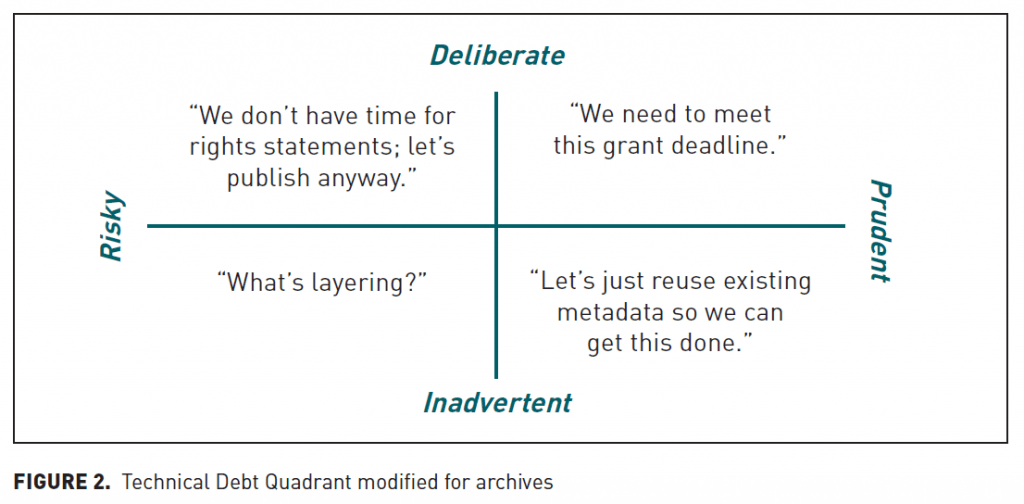 In my latest installment of Reading w/Dan, I’m following up on a suggestion from Carly Dearborn, our Ohio Public Policy Archivist, and have read “Toward a Conceptual Framework for Technical Debt in Archives” recently published in The American Archivist Spring/Summer 2022 issue. The article by Déirdre Joyce, Laurel McPhee, Rita Johnston, Julia Corrin and Rebecca Hirsch explores applying a framework based upon the concept of “technical debt” to inform decision-making in archives and libraries, in the management of their digital collections, objects and systems.
In my latest installment of Reading w/Dan, I’m following up on a suggestion from Carly Dearborn, our Ohio Public Policy Archivist, and have read “Toward a Conceptual Framework for Technical Debt in Archives” recently published in The American Archivist Spring/Summer 2022 issue. The article by Déirdre Joyce, Laurel McPhee, Rita Johnston, Julia Corrin and Rebecca Hirsch explores applying a framework based upon the concept of “technical debt” to inform decision-making in archives and libraries, in the management of their digital collections, objects and systems.
The concept of technical debt comes from the software development community, in which it describes the negative impact of compromises in the design and development of a software/system/platform—intentional or inadvertent—on efficiency and future administration, management and/or development. The authors suggest that the technical debt metaphor can be applied to archival and library practices, “In archives, the best purpose of a modified technical debt metaphor may be to develop a framework that helps archivists examine the strategies and work cultures driving decisions at their repositories and thereby prevent unmanageable technical debt from becoming an inevitable result of digital collections work.”
The concept is a mere 30-years old, first articulated in 1992. Even more importantly, it wasn’t until over a decade later that the software development community began considering it in the terms of a framework that can be used for strategy and decision-making. The authors describe this history before moving on to delve more deeply into how it can be applied as a conceptual framework for the archival/library community. In applying it to our profession, they note, “…while many other important foci exist in archives, such as community engagement, education, and public services, we limit the scope of this proposed framework to collections and digital asset management.”
Citing Nicolli Rios et al’s “A Tertiary Study on Technical Debt” they observe, “…planning deficiencies and unskillful project management as the most commonly cited causes of debt…other factors include a lack of knowledge or expertise among staff members, personality conflicts, weak documentation, and organizational issues such as resource allocation and business processes…” These are topics that I believe resonate with us in Ohio State’s University Libraries, especially as we continue our work around workflow process improvement and prioritized decision-making.
In moving from Fowler’s “Technical Debt Quadrant” to a “Technical Debt Quadrant modified for archives,” the authors eventually arrive at a “Model of the Conceptual Framework for Technical Dept in Archives.”
The authors present three case studies from the University of North Carolina at Charlotte, Carnegie Mellon University and Yale University that examine the impact of technical debt on their operations. The technical debt arose from various deliberate and inadvertent factors including lack of documentation to failure to adopt standards to inconsistency in metadata practices.
Three points the authors make in their conclusion particularly resonated with me that I believe can help inform our work in the University libraries:
- “The UNC–Charlotte case study, for example, introduced us to the ubiquitous nature of documentation debt.”
- “Likewise, looking at the Carnegie Mellon case through the technical debt framework reveals a deliberate effort to mitigate its own documentation debt—or, at the very least, make it more transparent.”
- Finally the use case from Yale views how “…the framework emphasizes how declaring bankruptcy on debt-laden projects can release organizations from a perceived obligation to sustain the unsustainable…” something we need to consider as we continue to migrate content from our so-called Dark Archive.
This is an interesting article that can help frame our discussions around process improvement and decision-making. Further, conceptually, technical debt should be a factor in any of our organizational discussions concerning system development, implementation, use and management, and sunsetting. I will leave you with two final quotes from their Conclusion:
- “All this notwithstanding, we maintain that—when carefully applied—the framework helps prevent oversimplification of the technical debt metaphor, such as an assumption that “shortcuts now equal more work later.” After all, shortcuts can represent sound decision-making (think: “more product, less process”).”
- “Moreover, inefficiencies or complexity in systems or processes are not necessarily bad; they are only problematic when staff and users are repeatedly slowed down by interacting or working around them. To that end, additional study that centers agency and the human role in technical debt management could potentially expand the framework in meaningful ways.”
Déirdre Joyce, Laurel McPhee, Rita Johnston, Julia Corrin, and Rebecca Hirsch “Toward a Conceptual Framework for Technical Debt in Archives” The American Archivist Vol. 85, No. 1, Spring/Summer 2022


